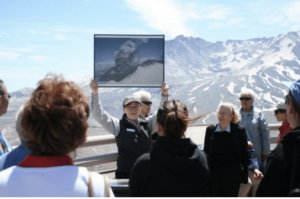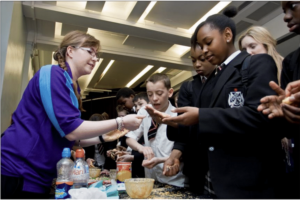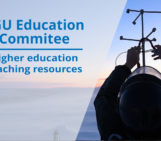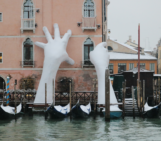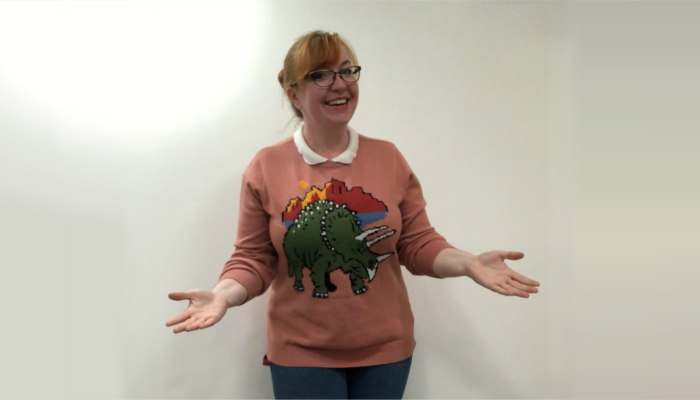
‘What I wish someone told me early in my career’ is a new Geolog series that aims to provide valuable insights and guidance to early-career professionals within the European Geosciences Union (EGU) community. Each month, I will interview a staff member of EGU to share their personal career journey, experiences, challenges faced, and the tips they wish they had received earlier in their careers. This month, I am kicking off the series with an interview with our Head of Communications, Hazel Gibson (she/her). Hazel Gibson joined EGU in 2020 as the communications officer and has been promoted to Head of Communications in 2022, overseeing EGU’s communications ever since. Let’s get to know her!
Hello Hazel and thank you so much for taking the time to sit with me for this interview! So to kick off, I am curious to know what motivated you to enter the field of science communication and how did this journey bring you to your current position at EGU?
This is a complicated question, as I didn’t set out to become a science communicator! In fact, when I first left school for university I didn’t even know that jobs like these existed! I didn’t know any scientists other than my doctor and dentist, and those I saw on television, but I was extraordinarily lucky to have teachers and parents who encouraged me to follow my curiosity even though none of us really knew what opportunities my interests could lead into.
I studied Physical Geography with Geology at undergraduate, Geohazard Assessment at masters, then left for my first job as a Geotechnical Engineer in Australia in 2006. It turned out that neither geotechnics nor Australia suited me, so I left to work as a ranger at Mt. St. Helens in the US. This was my first taste of paid work in science communication, and I was instantly hooked! When my visa expired, I couldn’t afford to renew it, so I returned to the UK and secured a position at the Natural History Museum in London. There, I served as a Science Educator and later as an Earth Sciences Identification Officer, identifying the strange and unusual items people brought in (unfortunately, it’s probably not a meteorite!).
London was an interesting place in the early 2010s, but still very expensive for someone on a very low wage (the financial crash hit the museum sector pretty hard) so I wanted to leave the city, and when I was approached by an old lecturer of mine to do a PhD I jumped at it. It was during the PhD in Geoscience Cognition and Communication that I first attended the EGU General Assembly (2014). I stayed in academia in the UK to do a postdoc, but after the Brexit vote my funding vanished (what a shocker) and I needed to find work quick. The job at EGU was posted in the autumn of 2019 and I arrived in Munich to start working as the Communications Officer in 2020.
What followed were four of the most unexpected years of EGU’s history – the pandemic, a huge move into digital work and expansion of EGU’s remit, a new hybrid meeting format, and so many other changes, we in the EGU office have been kept hopping this whole time! In 2021 I was promoted to Head of Communications after Terri Cook (former Head of Communications) returned to work in the US (after working remotely between Colorado and Munich for the last few years!!!!).
Can you tell me a little more about hazard as a field of study, and what are the career options for someone choosing to follow that path?
Geoscience hazards is a dynamic and fascinating field of study for anyone who is interested in pursuing geoscience work as a career. It covers a diverse range of subjects and fields from atmospheric hazards like hurricanes, windstorms and temperature anomalies all the way through to the deep earth hazards of earthquakes and volcanoes. Just take a look at the EGU’s Natural Hazards Division for an idea of the breadth of topics! It opens the door to a lot of potential career paths, as, unlike some other fields in geoscience, it tends to explicitly involve consideration of how people interact with natural environments. This sets you up very well for both academic and non-academic careers, including teaching, tourism work, insurance assessors, government advice, NGO or charity work and more. A geoscience conference is a great place to get employment ideas from the exhibition!
Looking back at your career path, what insights have you gained that you wish you had been aware of earlier?
My main takeaway is that networking isn’t as dreadful as it seems. I used to despise networking with a passion. It made me feel awkward, like a salesperson with nothing to sell. I’d show up at networking events, hover on the sidelines until I spotted a familiar face, and then make a beeline for them—only to feel embarrassed and guilty for not pushing myself harder!
Eventually, I discovered that networking can be more like making friends. The key is to let people know what you’re looking for. This approach works wonderfully with ‘friends’ in your network, as they’re likely to hype you up and promote your skills—but only if they know what you want. Take my PhD, for example. I stayed in touch with my lecturer over the years, helped him out whenever I could, and made it clear that I wanted a PhD. So, when an opportunity arose, he thought of me.
This strategy also works with strangers, though I preferred doing this over email. When I wanted to work at Mt St Helens, I found the program coordinator’s contact and emailed them saying, “This is what I want. Is there any way we can make it happen?” I had to be persistent yet polite, and I emphasized what I could bring to the table. It wasn’t a random request; it was specific—and eventually, they said yes!
As a woman in science, how have you navigated gender disparities and were there any pivotal moments in your career that made you realise that more work is needed on gender equality?
My first vivid encounters with gender disparity occurred during my initial job as a geotechnical engineer. Working on construction sites in Australia in the early 2000s, I faced a highly sexist and racist environment. As the sole woman on site, I was often patronized and harassed. At the time, I lacked the skills to effectively address these issues, partly because my upbringing had conditioned me to view such behavior as ‘normal.’ One particularly significant memory was my first day on site while menstruating. With no nearby bathrooms, I felt unprepared, uncomfortable and embarrassed. This experience led me to change my birth control to stop menstruation, a decision I would not make today and would advise others against.
Throughout my career, there has been significant progress. Awareness of appropriate conduct in diverse working environments has greatly improved, though there is a lot more to be done! A pivotal moment in my advocacy for gender equality came when a colleague recounted an incident where a man on site gave everyone nicknames, with hers being ‘bitch.’ The other men found it hilarious. The geoscience field’s struggles with gender equity reflect broader societal issues, but that doesn’t mean we have to accept them!
With significant experience in communications, some professionals could potentially decide to move to the corporate world. What has kept you from making that move?
Early in your career, many people come to realise that you can either pursue a job you love and believe in, or one that pays well. While this isn’t the case for everyone, it is a common experience. My first job paid well, but I didn’t love it and often found it unsatisfying. That was when I decided I was okay with not earning much if I believed in the work I was doing. Since then, I’ve consistently chosen work that I could be proud to talk about, as long as the salary covered my living expenses. Although I have never been as highly paid as I would have been had I chosen money over meaning, I’ve found fulfillment in my career choices. I’m fortunate in many ways, as I don’t have dependents other than my dog, Audrey, which makes living in expensive cities like London or Munich possible for me.
If you could offer advice to your younger self when starting your first full-time job, what would it be?
Trust your instincts. You know more than you think you do and though impostor syndrome is going to make your life harder, it’s a lie. Guess what, most people don’t really know what they are doing at first: as a friend used to say ‘have the confidence of a mediocre white man’! Don’t be afraid of quitting if you don’t like a job, use your work friends to help you find better employment. In fact, just don’t be afraid, you are going to do just fine.

